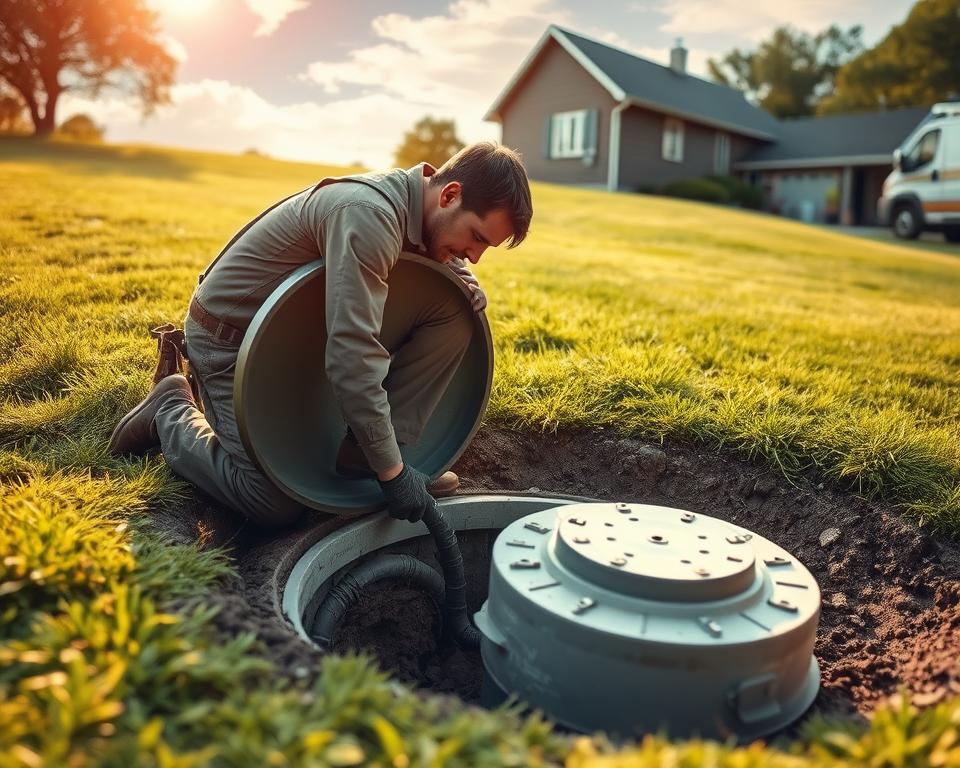Septic System Examination: Ensure Your Safety
Did you ever reflect on the significance of your septic system and the dangers of its failure? Nowadays, where proper sewage management is crucial, septic system inspections are crucial. They find issues early, warding off health hazards and expensive repairs. Particularly in rural locales, homeowners need to make these assessments a chief concern for property safety and environmental cleanliness.
Core Findings
- Routine septic system inspections are essential for preventing costly repairs.
- Septic tank evaluation can pinpoint problems early, defending public health and ecosystem.
- A certified septic inspection entails thorough examinations by licensed inspectors.
- Grasping your septic system can boost its longevity and efficiency.
- Neglecting to inspect can lead to major health risks and property damage.
Grasping the Importance of Septic Systems
Septic systems are crucial for managing household wastewater, particularly where there’s no municipal sewage link. They process on-site wastewater treatment, holding harmful pollutants at bay. This operation is key for environmental safety.
Consistent maintenance and checks are essential for septic systems to protect public health effectively. A system in good condition avoids wastewater leaks. These leaks can contaminate water sources, placing drinking water and community health at risk.
There’s a strong link between a well-managed septic system and environmental protection. Effective operation of these systems is key to reducing pollution and fostering eco-friendly living with septic tank inspection cost.
What Happens During a Septic System Inspection
The septic system inspection includes crucial steps to confirm its functionality and safety. Experts from All in Sanitation carry out a detailed review, focusing on various elements of the system. They seek to ensure everything is in excellent order.
During the inspection, technicians examine the septic tank, looking for any leaks or pipe issues. They measure the septic tank’s liquid levels to guarantee optimal performance. This thorough evaluation stops problems from escalating, sidestepping contamination and failure.
Knowing these critical steps enables homeowners to manage their septic systems effectively. By identifying issues early through a proper inspection, the system’s life can be significantly extended. This protects against potential risks.
Key Parts Checked in a Septic System Inspection
A complete septic system inspection examines key components to ensure its smooth functioning. The primary attention is on the septic tank, a core element of the system. Inspectors assess the tank’s condition, checking for wear or damage signs. They look over the tank walls, inlet and outlet pipes, and check for any blockages.
Inspectors also evaluate the drain field, essential for filtering effluent back into the groundwater. They look for standing water or odd vegetation signaling issues. The distribution box’s flow and distribution are checked to confirm consistency across drain lines.
The septic baffle’s health is another significant check. Technicians make sure that the baffles are intact and operate properly, blocking sludge from reaching the drain field. They also measure sludge and scum levels to ensure they are within safe limits.
The inspection’s closing phase is assessing the system’s watertight integrity. Inspectors confirm that the tank’s liquid level is normal, avoiding any potential leaks or overflows. This comprehensive check helps identify minor problems before they become large-scale repairs, thus preserving the septic system’s health.
| Component | Inspection Focus | Importance |
|---|---|---|
| Septic Tank | State of walls, pipes, and obstructions | Critical for waste collection |
| Drain Field | Standing water, vegetation anomalies | Guarantees proper effluent filtration |
| Distribution Box | Flow and distribution checks | Sustains balanced drainage |
| Baffles | Integrity and function | Prevents sludge migration |
| Liquid Level | Assessment of normal range | Prevents leaks and contamination |
Typical Problems Detected in a Septic System Inspection
In septic system inspections, experts often find various problems that degrade system efficiency. Chief among them are overloaded tanks, usually due to too much water use or unnoticed leaks. This condition hinders the system from processing wastewater correctly, causing backups and further issues.
Damage or malfunction in pipes is another typical issue found. Such faults impede wastewater flow and can lead to costly fixes if neglected. Clogged filters also pose serious problems, lowering system performance and creating environmental risks.
Lack of upkeep worsens these septic problems. Through regular checks, such issues can be identified and fixed early. This preemptive approach saves homeowners from hefty repair costs and safeguards community health.
How Long Does a Septic System Inspection
A standard septic inspection takes from two to 4 hours. Factors like property size and septic complexity affect this duration. Should unanticipated problems arise or bad weather block access, inspection times may extend. Preparing in advance with these timeframes in mind enables homeowners to schedule effectively for a detailed check.
It’s recommended for homeowners to be present at the inspection. It permits them to seek clarifications and hear the inspector’s observations firsthand. Arranging this for a time when full attention can be given enhances the experience and final result.
| Factor Affecting Time | Time Range |
|---|---|
| Basic inspection | 2 – 3 |
| Complex system | 3 – 4 |
| Unforeseen issues | 4+ |
How Often of Septic System Inspections
Regular septic inspections are vital to maintain your system’s longevity and performance. It’s widely recommended for homeowners to have their septic system inspected every three years. This frequency may be modified depending on factors like the size of your household, the volume of daily water use, and the system’s age.
Larger families or homes using garbage disposals might need inspections at shorter intervals. Keeping up with the right maintenance schedule is vital. It assists detect potential problems early and secures your system operates efficiently.
Here’s a useful table outlining factors that might affect your inspection frequency:
| Factor | Inspection Cadence |
|---|---|
| Standard Household (2-3 people) | Every 3 years |
| Larger Household (4+ people) | Every 1-2 years |
| Home with Garbage Disposal | Every 1-2 years |
| Older Septic System | Annually |
Following a regular septic maintenance plan offers peace of mind. It avoids costly repairs and keeps your residence safe and sanitary.
Consequences of Neglecting Regular Septic System Inspections
Not scheduling periodic septic inspections increases the risk of system failures. Early-stage issues can grow into larger ones, demanding high-priced repairs. Wastewater backups from these failures endanger homes and the environment, risking groundwater contamination.
Unresolved septic issues put people and pets to harmful bacteria and diseases. Homeowners could avoid hefty expenses with scheduled inspections. Ignoring routine maintenance can escalate a small problem into a larger crisis, upsetting your daily life and causing stress.
The financial burden of replacing an entire septic system can be overwhelming. Homeowners bear the full cost. However, regular inspections allow early problem detection, thwarting issues from worsening. Regular maintenance not only extends the system’s life but also saves homeowners from potential financial and environmental disasters.
Advice for Owners: Maintaining Your Septic System
For homeowners, septic system care is essential for its longevity and function. Practicing proper maintenance tips ensures smooth operation and reduces repair costs. Simple steps can greatly enhance septic tank performance.
Reducing water use in the home is crucial. Minor tweaks like repairing leaks and choosing water-saving fixtures ease strain on the system. Households should be mindful of their water consumption.
Appropriate trash disposal is key. Do not flush items such as wipes, sanitary products, and grease – they harm the system’s balance. Dispose of such materials properly, using refuse receptacles or compost.
Limiting strong chemicals is also important. Household cleaners can kill the beneficial bacteria in your septic tank. Opt for eco-friendly cleaning products to preserve this crucial ecosystem.
Frequent inspections on the drain field area are essential for effectiveness. Monitor for saturated soil or standing water, signs of possible problems. These issues demand quick action.
| Action | Rationale |
|---|---|
| Conserve water | Prevents system overload |
| Properly dispose of waste | Maintains balance of the tank |
| Limit harsh chemicals | Protects beneficial bacteria |
| Inspect drain field | Identifies potential problems early |
Implementing these septic system maintenance strategies will keep your septic care in check. This ensures a functional, enduring system for the future.
Professional Septic Inspection Services
Selecting professional septic inspection services is essential for homeowners. Companies like All in Sanitation provide detailed septic system evaluations. Their trained experts ensure no major issue goes unnoticed.
These professional septic technicians employ advanced methods to discover problems. This capability is critical for ensuring your septic system’s longevity and your property’s health. They educate homeowners on how to keep your system functioning well.
Gains of Working with a Certified Septic Inspector
Working with a certified septic inspector offers key rewards for homeowners. These inspectors have extensive knowledge of local regulations and industry norms. Their expertise guarantees detailed, accurate inspections, reducing the risk of missing key issues.
These experts have the skills to spot a larger spectrum of potential issues. Because of their advanced training, certified inspectors can recognize subtle signs of deterioration or failure. This ability secures problems are handled early, saving homeowners significant costs and averting severe problems later.
Another important benefit is the peace of mind they provide to homeowners. Understanding a qualified professional is evaluating their system builds confidence. This certainty about the inspection’s quality provides extra security, bolstering the system’s reliability.
In closing, the positives of hiring a certified expert for septic inspection obviously surpass any cost involved. These benefits include pinpoint accuracy, early detection of potential problems, and a strong sense of security among homeowners about their septic systems.
The Bottom Line
Consistent septic inspections are imperative for homeowners who wish to sidestep costly repairs. These checks go beyond mere routine. They highlight the key function of maintenance in keeping septic systems functioning smoothly.
Collaborating with certified experts, such as All in Sanitation, allows homeowners to sustain the efficacy of their septic systems. This forward-thinking strategy does more than just protect property value. It also supports community well-being and environmental health.
Taking timely measures on septic inspections protects your investment. It guarantees your home remains a safe and inviting haven for your loved ones.



